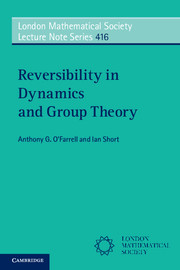Book contents
- Frontmatter
- Contents
- Preface
- 1 Origins
- 2 Basic ideas
- 3 Finite groups
- 4 The classical groups
- 5 Compact groups
- 6 Isometry groups
- 7 Groups of integer matrices
- 8 Real homeomorphisms
- 9 Circle homeomorphisms
- 10 Formal power series
- 11 Real diffeomorphisms
- 12 Biholomorphic germs
- References
- List of frequently used symbols
- Index of names
- Subject index
2 - Basic ideas
Published online by Cambridge University Press: 05 June 2015
- Frontmatter
- Contents
- Preface
- 1 Origins
- 2 Basic ideas
- 3 Finite groups
- 4 The classical groups
- 5 Compact groups
- 6 Isometry groups
- 7 Groups of integer matrices
- 8 Real homeomorphisms
- 9 Circle homeomorphisms
- 10 Formal power series
- 11 Real diffeomorphisms
- 12 Biholomorphic germs
- References
- List of frequently used symbols
- Index of names
- Subject index
Summary
Reversibility
The natural context for the study of reversibility is the theory of groups. In this chapter we review the basics of reversibility, borrowing heavily from work of Aschbacher, Baake, Goodson, Lamb, and Roberts [12, 19, 110, 159, 164]. We assume throughout that G is a group with identity 1.
2.1.1 Reversible elements
An element g of a group G is said to be reversible in G if there is another element h of G such that
hgh−1 = g−1.
In finite groups, the reversible elements are called real elements because of their relationship with real characters (see Chapter 3, page 49). We denote by R(G), or just R if the context is clear, the set of reversible elements in G. The reversibility problem in G is the problem of characterising the reversible elements of G.
If the equation hgh−1 = g−1 is satisfied, then we say that h reverses g and h is a reverser for g. We denote by Rg(G), or just Rg, the set of reversers for g, which may of course be empty. We note that h reverses g if and only if ghg = h; that is, the reversers of g are the fixed points of the bijection x ↦ gxg.
We denote the set of involutions in G (elements of order at most two) by I(G), or just I. Thus
I = {g ∈ G : g2 = 1}.
Example 2.1
(i) The identity 1 is reversible, and every element of G reverses 1.
(ii) An element of G is an involution if and only if it is reversed by 1.
(iii) If G is an abelian group, then R = I and R is a subgroup of G. As a special case, if G is a cyclic group of even order, then it has two reversible elements: the identity and the element of order two.
[…]
- Type
- Chapter
- Information
- Reversibility in Dynamics and Group Theory , pp. 22 - 38Publisher: Cambridge University PressPrint publication year: 2015



